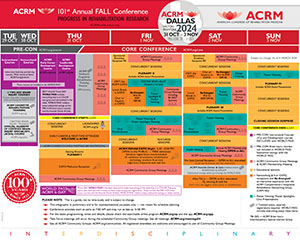Full Schedule
Not registered yet? Register and SAVE 20% using the code "finaldays20" at checkout. DETAILS: ACRM.org/finaldays20
QUESTIONS? Email —>meetings@acrm.org
Full Schedule
- Thursday, October 31, 2024
-
7:30 AM – 5:30 PMNCCIH/NCMRR R13 Diversity Mentoring and Career Development in Complementary and Integrative Rehabilitation Medicine Workshop (by invitation only)
-
2:30 PM – 3:30 PMContributing Factors in Chronic Traumatic Brain Injury Morbidly and the Impact these have on Rehabilitative Efforts
-
2:30 PM – 3:30 PMNIDILRR ARRT Fellows SymposiumCorresponding Presenter: Linda Vo, MPH (she/her/hers) – National Institute on Disability, Independent Living, and Rehabilitation ResearchModerator: Allen W. Heinemann, PhD FACRM (he/him/his) – Northwestern University Feinberg School of MedicineTechnologyAging Research & Geriatric RehabilitationClinical PracticeDiversity, Equity and Inclusion
- Friday, November 1, 2024
-
8:15 AM – 9:15 AMRacial and Ethnic Disparities in Speech-Language Pathology Care and Outcomes in Adults with Oropharyngeal Dysphagia
-
8:15 AM – 9:15 AMThe Downward Financial Spiral of Cancer: Impact of Financial Toxicity on Cancer Care Outcomes
-
8:15 AM – 9:15 AMVenous Thromboembolism Prevention for Patients with Non-Traumatic Spinal Cord Injury Due to Cancer
-
1:15 PM – 2:15 PMDisability Inclusion in Rehabilitation Sciences: An Insider’s Perspective
-
1:15 PM – 2:15 PMSheldon Berrol Memorial Chautauqua Symposium: Identity in Flux: Understanding Disability After Traumatic Brain Injury 0596
-
1:15 PM – 2:15 PMSPECIAL SYMPOSIUM: Making an Impact: Tips on Conducting and Disseminating Policy-relevant Research
-
3:00 PM – 4:00 PMClinical Practice Oral Presentations 1
-
3:00 PM – 4:00 PMDiversity, Equity & Inclusion Oral PresentationsDiversity, Equity and Inclusion
-
4:15 PM – 5:15 PMMind Matters: Navigating Mental Health in Early Career Researchers
-
4:15 PM – 5:15 PMSports Participation among Youth with Lower Limb Amputation/Transverse Lower Limb Deficiency
- Saturday, November 2, 2024
-
8:15 AM – 9:15 AMDementia Prevention 2024 Session I
-
8:15 AM – 9:15 AMEmployment Disparities Faced by Refugees with Disability Living in the U.S.
-
8:15 AM – 9:15 AMUsing Artificial Intelligence to Promote an Environment of Research and Innovation in a Hospital Setting
-
10:30 AM – 11:30 AMAdvancing Equity in TBI Rehabilitation Research: A Call to Action
-
10:30 AM – 11:30 AMBRUCKER SPECIAL SYMPOSIUM: Arranging Pretty: Piecing Together Meaningful Clinical/research Relationships - This event is followed by a reception sponsored by CARF International
-
10:30 AM – 11:30 AMGrappling with Uncertainty: Care Partners and Rehabilitation Practitioners Hope for the Recovery of Persons in Disorders of Consciousness
-
10:30 AM – 11:30 AMWild Measurement: Strategies to Capture Meaningful Performance Improvements from Rehabilitation
-
4:00 PM – 5:00 PMIdentification of Candidates for Acute Inpatient Rehabilitation Admission with Visual Management System
-
4:00 PM – 5:00 PMMusic Therapy and Speech Language Pathology in Stroke Comprehensive Rehabilitation
-
4:00 PM – 5:00 PMSPECIAL SYMPOSIUM: 8th Annual Women in Rehabilitation Science Symposium
-
4:00 PM – 5:00 PMSPECIAL SYMPOSIUM: What Did Mr. Rogers Know About Brain Injury? The Effects of Neighborhood on TBI Outcomes
-
4:00 PM – 5:00 PMThe Lived Experience and TBI Research: Leveraging Community Voices Through Community Advisory Boards
- Sunday, November 3, 2024
-
12:45 PM – 1:45 PMCulturally Adapted Dementia Caregiver Training and Support for Diverse Caregivers
-
12:45 PM – 1:45 PMSPECIAL SYMPOSIUM: The Psychology of Recovery: How to Identify and Incorporate Psychological Factors into the Plan of Care
-
2:00 PM – 3:00 PMLeveraging Social Determinants of Health Data to Improve Post-Acute Stroke Outcomes: Implications for Practice

.jpg)
.jpg)
.jpg)
